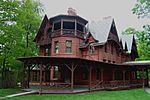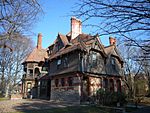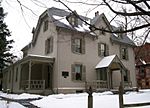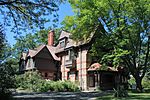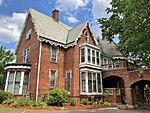Nook Farm (Connecticut) facts for kids
Quick facts for kids |
|
|
Nook Farm and Woodland Street District
|
|
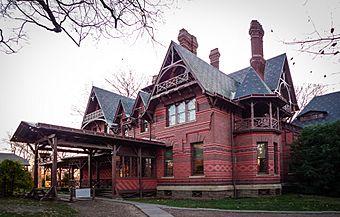
The Mark Twain House
|
|
| Lua error in Module:Location_map at line 420: attempt to index field 'wikibase' (a nil value). | |
| Location | Woodland, Gillett, and Forest Sts., and Farmington Ave., Hartford, Connecticut |
|---|---|
| Area | 41 acres (17 ha) |
| Architect | Brocklesby, William C.; Multiple |
| Architectural style | Late 19th and 20th Century Revivals, Gothic, Queen Anne |
| MPS | Asylum Hill MRA |
| NRHP reference No. | 79002674 |
| Added to NRHP | November 29, 1979 |
Nook Farm is a special historic neighborhood. It is located in the Asylum Hill area of Hartford, Connecticut. This neighborhood is on the western edge of the city.
Contents
History of Nook Farm
How Nook Farm Started
In the early 1800s, this area was mostly a large farm. It was called the Imlay farm. In 1853, two men bought this land. They were John Hooker and his brother-in-law, Francis Gillette. They wanted to build homes there.
They built their own houses first. Then, they sold parts of the land to their family and friends. This helped create a unique community.
A Community of Ideas
Many interesting people came to live in Nook Farm. It became a place for artists and thinkers. Famous residents included Harriet Beecher Stowe and Mark Twain. Other people were writers, journalists, and reformers. Reformers are people who work to change society for the better.
The community also included feminists. These are people who support equal rights for women. There were also spiritualists and activists.
Why it's Called Nook Farm
The area got its name from a nearby river. The Park River had a bend or "nook" in it. This river bordered the neighborhood on two sides. So, the name Nook Farm made perfect sense.
Mark Twain once said that doors were always open in Nook Farm. This shows how friendly and welcoming the neighborhood was. It was a place where people shared ideas. They talked about politics and important changes happening in the country.
Homes of Nook Farm
Leading architects designed the homes in Nook Farm. Some famous architects were Edward Tuckerman Potter and Richard Upjohn. Many of these beautiful homes were later torn down. For example, eleven houses were removed for the Hartford Public High School.
But some of the original homes still stand today. The Mark Twain House and the Harriet Beecher Stowe House are now museums. You can visit them to learn about history. The Katherine Day House is also a museum. The John and Isabella Hooker House is now an apartment building. So is the House at 36 Forest Street, which was built a bit later.
Nook Farm Historic District
What is a Historic District?
A historic district is a special area. It is recognized for its important history and buildings. These areas are protected to preserve their unique character.
Nook Farm's Special Status
A large part of Nook Farm became a historic district in 1979. It was listed on the National Register of Historic Places. This means it's a very important historical site in the United States.
The heart of the district is where the Mark Twain and Harriet Beecher Stowe houses are. The district stretches along Forest Street. It also goes north along Woodland and Gillett Streets. It reaches roughly to Niles Street. Besides the old mansion houses, there are also stylish apartment buildings from the early 1900s.
Gallery
-
Mark Twain House from Southeast, 2004
 | Dorothy Vaughan |
 | Charles Henry Turner |
 | Hildrus Poindexter |
 | Henry Cecil McBay |


